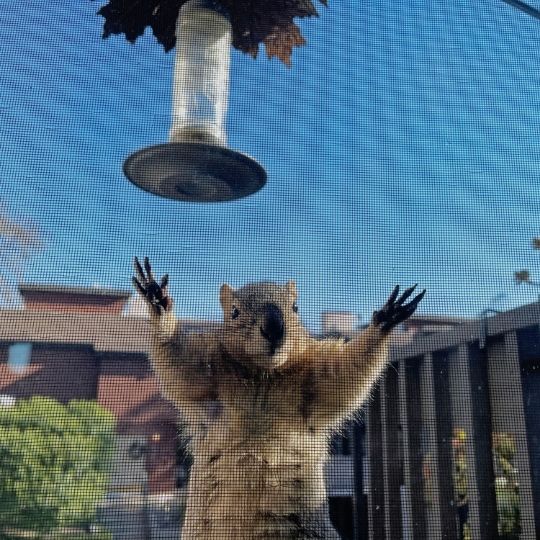
The Hot Sauce Hack Squirrels Don’t Want You to Know
Does your bird feeder bring all the squirrels to the yard? Well, we’ve got a little Aardvark secret for you: Spice up your birdseed with a little hot sauce, and those squirrels will start swinging from your neighbor’s bird feeder instead of yours. Here’s why:
Birds are not sensitive to capsaicin (the compound that gives hot chili peppers their spiciness), but squirrels and other seed-eating rodents definitely do not like their food spicy. One whiff of hot sauce in the bird feeder will be enough to encourage them to nibble elsewhere. That’s a win for your backyard birds–and for you, because you’ll be able to finally recycle that old hot sauce bottle that’s been rolling around the back of your refrigerator.
You know the one: that sauce you bought years ago, but you just can’t bring yourself to toss it in the trash (because that would be wasteful)? Chances are if you don’t like it, your average squirrel won’t like it, either. Because squirrels hate hot sauce.
The pepper defense
The reason rodents hate hot sauce goes all the way back to why chili peppers evolved to be spicy in the first place. Pepper plants developed capsaicin to protect their seeds against predators that would chomp (or otherwise destroy) their babies. Birds lack the pain receptor for capsaicin, though, so they don’t feel any discomfort eating the spicy fruit of the pepper plant. They chow down and then disperse the seeds, which greatly benefits the mama pepper plants.
Speaking of mutual benefits…
Capsaicin also just so happens to deter the growth of bacteria, molds, etc., that would harm the pepper plants. That antibacterial effect came in handy for humans living in hot equatorial climates, where food tends to spoil faster. It’s thought that people’s love of spicy cuisine developed as an evolutionary advantage. Food containing spicy peppers was simply safer than food without them.
How much hot sauce to add to your birdseed?
While Secret Aardvark doesn’t have a squirrel research team, per se, we have done some Internet research. There’s no hard-and-fast rule or recommendation for combining hot sauce and birdseed. We suggest stirring in one or two tablespoons per pound of seed.
Take care to distribute the hot sauce as evenly as possible. Sprinkle the mixture into a flat layer on a baking sheet, allowing the seed to dry fully before loading up your feeder. And, so you know, capsaicin is non-toxic to birds and squirrels, so you can feel free to experiment with the proportions a bit.
Got squirrels chewing through the side of your house?
Spring is squirrel nesting time…and the time they’re most prone to chewing through your siding (or chewing up fence posts, shingles, garden structures, etc. Squirrels gotta squirrel). If you detect some off-book squirrel-related carpentry at your house, you can also dilute some hot sauce in water and apply it to the affected area. They’ll take the hint and look for easier gnawing elsewhere.
First, find a calm day when there’s no rain in the forecast. Rain will wash away the hot sauce, and wind will risk blowing it away (or getting in your eyes). Wear gloves and eye protection to be safe.
Add a little liquid dishwashing detergent (1 teaspoon or so) to 1 bottle of hot sauce and one quart of water. Use a sponge or a household spray bottle to apply the mixture to the lower shingles along the roofline and/or along the roof’s edges (or to the area you notice them chewing). Be careful to apply just to the affected wood area—and not to douse any adjacent flowering plants (capsaicin isn’t good for bees).
The hot sauce won’t last for long; it will wash away, so you may have to re-apply it if your squirrels are persistent.
A word about safety for bees
While some folks on the Internet suggest using hot sauce to make natural insecticidal sprays for garden plants, we recommend against it. Capsaicin is toxic to honeybees! So, it’s best to avoid spraying plants, especially while in bloom since bees are, of course, drawn to the flowers.
Bees aren’t interested in the seeds in your bird feeder, though. And after adding a little hot sauce to your seed mix (or wood siding), Mr. Squirrel won’t be interested, either.

